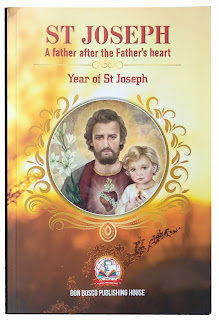Biblical Understanding of the Evangelical Counsels (Article Review)
This is a review of an article that appeared in Vaiharai, 20/1, Jan-Jun 2015. The article was entitled ‘Biblical
Understanding of the Evangelical Counsels’ by Dr Denis Kulandaisamy, OSM.
Through the article, the author aims at establishing a
biblical basis for religious life. Religious life has played an important role
in almost every traditional religion, he begins. He does not go on to back up
this statement nor does he venture to provide any further information. He just
leaves it in the air, supposing the readers will understand. Under the
inspiration of the Holy Spirit, different forms of religious life have arisen.
The most common division made in consecrated life is between the contemplative
and active ways of living. Both of these are founded on the evangelical
counsels, which are not inventions of the founders but are rooted in the
Gospels themselves.
The article is divided into two parts. The first part deals
with the basic concepts of consecrated life and the evangelical counsels in
general, while the second part contains theological explanations of the
evangelical counsels. The author begins by presenting a brief history of
religious life, namely its origin and forms, and picks out a few key
characteristics. He then moves into presenting the place of the Bible in
religious life and the biblical foundations as indicated by a few documents of
the Church. He lists out every biblical reference used in three Church
documents: Lumen Gentium (chapters
5-6), Perfectae Caritatis and Vita Consecrata. These lists stretch
across roughly five and a half pages! The author has not bothered to provide
even a short description of each passage. What he has done instead is group the
passages according to the books of the Bible. He confesses that commenting on each of the
references would be ‘very interesting and useful’ but he refrains from doing so
for practical reasons. For the benefit of all, I sincerely hope the author
considers taking up one text at a time and providing us with the theological
meanings of the bible texts in the context of religious life. This would
illumine every reader and help them see the significance of the biblical text
to religious life.
The second part deals with each of the counsels
individually. The methodology followed is: a brief introduction, a presentation
of the Old Testament understanding of the particular counsel followed by the
New Testament understanding. Chastity and Obedience are presented with the
above stated methodology but Poverty, for some reason, is not. The counsel of chastity,
the author mentions, has anthropological, existential, ontological and
theological significance, but he does not delineate any of these in his
treatment of the counsel, except perhaps, the last one. In the section of
‘Chastity in the Old Testament’, he gives three examples: the daughter of
Jephthah (Jgs 11:37-40), Jeremiah, the prophet (Jer. 16:1) and the people of Israel
(Amos 5:2; Jer. 2:32). From these he concludes that virginity was looked on as
a sign of curse, punishment or disgrace. To me, this conclusion applies to the
first and third examples but not to the second one. In the case of Jeremiah,
his virginity was meant to be lesson for the people, similar to what the
counsel of chastity is meant to do. The author cites an insight of A. Aparicio
Rodriguez, that ‘towards the end of the Old Testament period, a new line of
thought emerges regarding this point’ (chastity). To back this claim, two
passages from Isaiah and Judith are cited. These reveal a change in Jewish
mentality with regard to celibacy and sexual abstinence. They are seen as a
means of establishing a close relationship with God. I do not agree completely
with this claim. If it were so, Elizabeth
would not be ashamed of her barrenness (Lk 1:25). While Rodriguez may have good
reasons to have made the assertion of a change in Jewish mentality, it is not
seen in the New Testament as he claims. Of course I cannot rely on just this
one example but then, the New Testament does not speak much with regard to
Jewish tradition regarding childbearing. The focus instead is shifted to the
person of Jesus and his role as the Messiah, fulfilling the prophecies of the
Old Testament.
I do not have any comments to make with regard to the rest
of the article. The author has attempted to present a biblical foundation for
the evangelical counsels and I commend his attempt. However, I feel that he had
nothing really original to offer. His insights were pretty bookish, although
they reflected the truth. I would have expected insights that were more pertinent
to the present state of consecrated life in the world today.


Comments
Post a Comment